First Term Social Studies Lesson Note for Primary 6
ACCESS ALL LESSON NOTES
ACCESS ALL QUESTIONS AND ANSWERS
ACCESS ALL WORKSHEETS
ACCESS ALL JOBS ACCESS
ACCESS WAEC QUESTIONS AND ANSWERS
SOCIAL STUDIES PRIMARY SIX (6)
FIRST TERM
WEEKS TOPICS/CONTENTS
1. External influence on Nigerian family life.
2. The influence of working parent on the Nigerian Family.
3. Inter – marriage
4. Pre-marital sexual relationship
5. Some foreign cultures that are affecting our Values and cultures
6. Religious intolerance in Nigeria
7. Labor and Trade Union
8. Wages and income distribution
9. Employment
10. Nigerian and foreign made goods
11. Resources development – Natural resources are
WEEK 1
TOPIC: External influences on Nigerian family life
BEHAVIORAL Objectives
By the end of the lesson, you will be able to:
1 list the foreign influences on Nigerian family life.
2 explain how religion influences Nigerian family life
3 discuss the influences of working parents on the Nigerian family
INSTRUCTIONAL MATERIALS: A chart showing couples getting wedded.
REFERENCE MATERIALS
Scheme of work
All relevant materials
6-Years Basic Education Curriculum
Online information
BUILDING BACKGROUND/CONNECTION TO PRIOR KNOWLEDGE:
Pupils are familiar with the topic in their previous classes.
CONTENT
Meaning of external influences
External influences are the lifestyles of other people, which our people now imitate and practice. These influences come mainly from Europe, the Middle East (i.e. Arab countries) and the United States of America.
Family life in Nigeria before the advent of foreign influences In the past, the Nigerian family life was simple. Everybody had something to
do for a living. In the family, the man, woman and children contributed to the upkeep of the family. Marriage practices were based on the African traditional system, while the ethnic group one belonged to determined one’s mode of dressing and lifestyle. All of these have greatly changed as a result of foreign influence, though some of the traditional practices still exist.
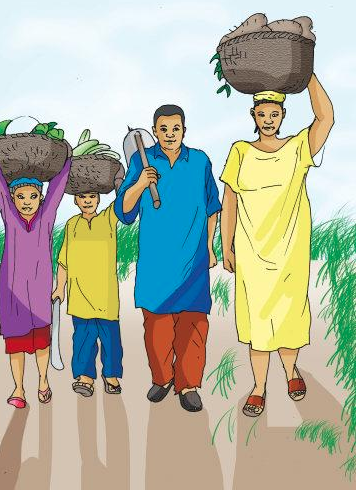
Influence from foreign countries on Nigerian family life Our contact with foreigners has affected our family life in many ways. The following are among the factors responsible for these changes: 1 Education: The education of the child used to take place in the family. Parents and older relatives such as grandparents, uncles and aunts were the teachers. But today, there is a complete change from the traditional education to Western education as a result of foreign influences on our family life. Children are now sent to schools, away from their homes, where they are taught to read and write under the supervision and guidance of trained teachers. 2 Food and eating habits: In the past, all members of the family worked and helped on the farm to produce the food needed at home. People ate mainly local food like yam, plantain, and cassava which was processed into garri and fufu. Now, many people prefer to eat bread, cakes, cornflakes, custard, noodles and other processed foods. In former times, Africans, especially the children, usually sat on the floor and ate together from a big bowl or tray, using their fingers. Now many people use cutlery to eat their food, including our staple foods like eba, tuwo and fufu.
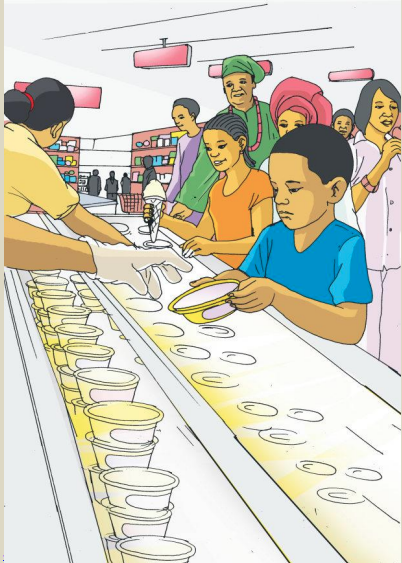
3 Baby feeding habits: In the past, babies were fed only on breast milk. But nowadays, there are many types of baby food, which are produced from cow milk. Many mothers who work as traders, teachers or office workers, use the different types of baby food to feed their babies. 4 Religion: Before our contact with foreign culture, we practised the African traditional religion, which involved the worship of gods and goddesses. However, in these modern times, many of our people practise Christianity and Islam. Many people today still practise the African traditional religion, even along with Christianity and Islam

Christianity, for instance, forbids the worship of gods and goddesses. Those who practise African religion are called pagans or idol worshippers by Christians and Muslims. Rather than obey the traditional priests and priestesses, Christians are expected to obey the pastor and the teachings of the Bible while the Muslims are expected to obey the Imam and the teachings of the Quran. 5 Marriage practice: In the past the parents of young people arranged marriages. A young man expected his parents to choose a good girl from a good family for him. In some cases, parents forced their children to marry people they (the children) did not even like. Now, young men and women choose their own partners and plan their own marriages. Sometimes, they even conclude all the arrangements before they inform their parents.
We now have Christian, Muslim and ordinance marriages. These types of marriage have been added to our traditional forms of marriage. Traditionally, the whole community should be involved in a marriage ceremony, but now a couple may decide to get married quietly at the registry. They may invite only a few people to the ceremony. Many people have also found a way of combining the traditional marriage ceremony with the foreign ones. 6 The extended family practice: The extended family practice, which is a way of showing deep love and concern for members of our family and those around us, is gradually fading out of Nigerian family life. Many people now prefer to have a small family. Some people who are not even Christians just maintain a nuclear family. 7 Music: Our traditional forms and styles of music are now giving way to Western music. The traditional musical instruments and ways of playing music have changed to the use of sophisticated musical instruments, and the recording of songs on tapes, VCD, audio CD and DVD. 8 Language: Many of our indigenous languages are going into extinction because many parents prefer to communicate with their children in English. Also, some schools discourage pupils from speaking their mother tongue in class. Pupils who disobey this order are sometimes severely punished. Influence of religion on Nigerian family life Marriage pattern: African traditional religion allows and even encourages polygamy, in which a man marries many wives and has several children. Christianity changed this as it preaches one man one wife (monogamy). As a result of this, most Christian families now practise monogamy. With this, the man has fewer children to care for. He may also have fewer problems in maintaining his family. Islam permits a man to have up to four wives.
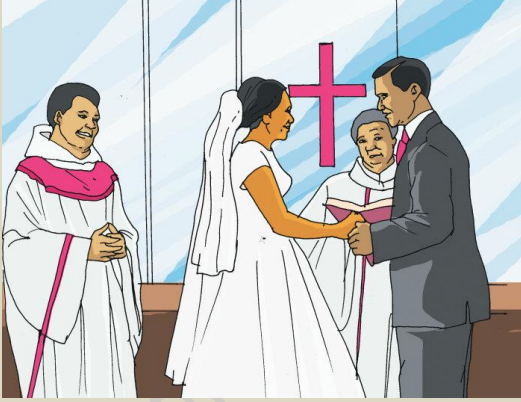
WEEK 2 TOPIC: Influence of working parents on the Nigerian family Nowadays, because of the harsh economy, and in order to be able to provide for their families, most parents go out to work and earn money. Many parents cannot take good care of their children because they are at work most of the time. The children are either left at home with house-helps, or they are taken to day-care centers or playgroup houses. In some rare cases, the children are taken to foster homes. A foster home is a place where some people take care of children of other families, under certain conditions, for a number of years. Thus, children of working parents may grow up without adequate care and attention, and may turn out to become depressed or wayward, because their parents were busy earning money at the time when they should have taken very good care of them. Assessment & Evaluation:
1 list the foreign influences on Nigerian family life. 2 explain how religion influences Nigerian family life 3 discuss the influences of working parents on the Nigerian family (WRAP-UP CONCLUSION) Teacher goes over the topic once again to enhance better understanding Exercise A Choose the best answers for the following questions: 1 The lifestyle of other people, which our people now imitate and practise is called ______________. A internal influence B external influence C family influence D social influence
2 In the olden days, the Nigerian family life was very _______________. A complicated B complex C simple D mild
3 External influence on Nigerian family life comes mainly from the following except ______________. A United States B Europe C Arab countries D South Africa
4 In the past, a person’s mode of dressing depended on his/her _____________. A religion B occupation C ethnic group D family style
5 Which of the following factors is not responsible for changes in Nigerian family life? A Marriage practices B Education C Food eating habits D Religion
6 Today, children’s education has changed from traditional to ____________. A Eastern education B Western education C political education D social education
7 Which of the following is a processed food? A Yam B Plantain C Bread D Cassava
8 One of the following is a local food. A Bread B Beans C Baked beans D Cakes
9 Before now, babies were fed _________________. A cow milk B Golden Morn C breast milk D custard
10 The practice of one man, one wife is called _______________. A Christian marriage B monogamy C polygamy D polyandry
11 Which of the following religions encourages only the marriage of one man, one wife? A Islam B African traditional religion C Judaism D Christianity
12 Those who practise African traditional religion are called ______________. A priests B traditional worshippers C Muslims D Christians
WEEK 3
TOPIC: Intermarriage Behavioral Objectives By the end of the lesson, pupils should be able to: 1 explain the concept of intra-ethnic marriage. 2 explain the concept of inter-ethnic marriage. 3 state the advantages of inter-ethnic and intra-ethnic marriages. 4 identify relevant values of intermarriage. INSTRUCTIONAL MATERIALS: A chart showing couples getting wedded. REFERENCE MATERIALS Scheme of work All relevant materials 6-Years Basic Education Curriculum Online information BUILDING BACKGROUND/CONNECTION TO PRIOR KNOWLEDGE: Pupils are familiar with the topic in their previous classes. CONTENT Meaning Intermarriage An intermarriage is one in which people from different groups marry. They may be from different social, racial, ethnic or religious groups. Intra-ethnic marriage An intra-ethnic marriage is the union between a man and a woman from the same ethnic group. Examples are when an Igbo man from Anambra State marries a woman from another Igbo-speaking place (e.g. Imo State), a Yoruba man from Ogun State getting married to a Yoruba woman from Oyo State, and a Hausa man from Kano State taking a Hausa wife from Kaduna State. Inter-ethnic marriage An inter-ethnic marriage is the union between a man and a woman from different ethnic groups. The following are some examples of inter-ethnic marriage:
1 A marriage between a Yoruba man and a Hausa woman.
2 A marriage between an Igbo man and an Efik woman.
3 A marriage between an Urhobo man and a Nupe woman
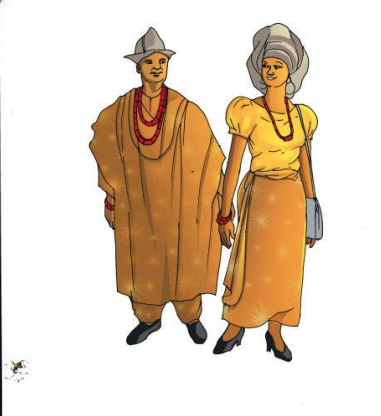
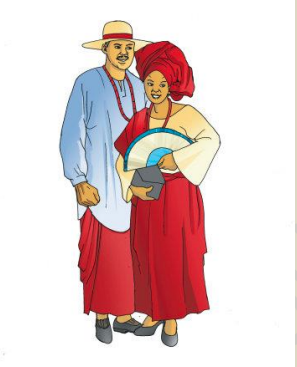
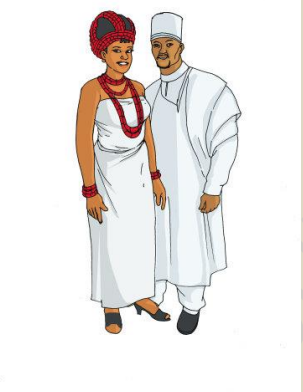
Advantages of inter-ethnic marriage
1 It helps to promote inter-ethnic relationships.
2 It helps to promote national unity.
3 It leads to proper understanding of each other’s customs.
4 It reduces inter-ethnic clashes.
5 It leads to communal peace.
6 The children will have relations from two or more ethnic groups. Disadvantages of inter-ethnic marriage
1 At the beginning, the couple might find it difficult to understand each other’s customs. This may cause quarrels and misunderstanding between the man and woman.
2 The couple may have to travel long distances before they can reach their inlaws.
3 The children of such a marriage may be confused as to the language they should speak, and may eventually speak neither their father’s nor their mother’s.
4 The relatives of both the man and woman might find it difficult to relate or cooperate with each other because of the difference in language and culture. Assessment & Evaluation: 1 explain the concept of intra-ethnic marriage. 2 explain the concept of inter-ethnic marriage. 3 state the advantages of inter-ethnic and intra-ethnic marriages. 4 identify relevant values of intermarriage. (WRAP-UP CONCLUSION) Teacher goes over the topic once again to enhance better understanding ASSIGNMENT Define marriage. Mention four (4) ways in which people marry in Nigeria today. What is intermarriage? Mention three (3) types of intermarriage. State four (4) disadvantages of inter-ethnic marriage. Differentiate between intra-ethnic marriage and inter-ethnic marriage. Give three (3) examples of inter-ethnic marriage. State three (3) advantages of inter-ethnic marriage
DON’T STRESS, JUST LET PROFESSIONALS DO THE STRESS, CLICK HERE TO BUY THE COMPLETE LESSON NOTE (WEEK 1-12 WITH PICTURES AND REFERENCES) FOR JUST 700 NAIRA OR HIT THE WHATSAPP BUTTON BELOW
